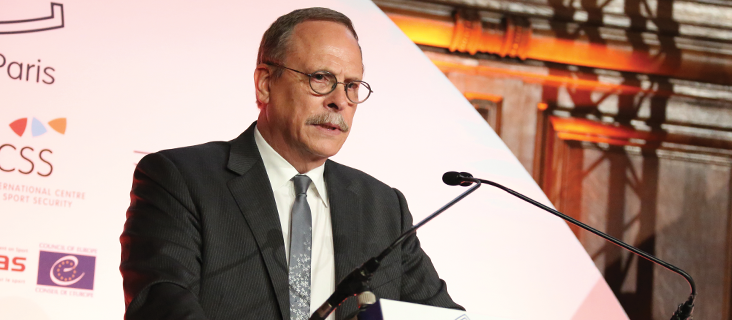Eaton’s Take on Tennis
Media ReleasesChris Eaton – My take on recent match fixing allegations in Tennis
Over the past few years almost all international association sports, and in fact many national boutique association sports, have been exposed for their integrity vulnerability. On the basis of the recent (January 2016) BBC/Buzzfeed expose, Tennis is again publicly exposed for both for its vulnerability to betting-fraud related match fixing and for its poor choice of structure and process for its so-called Tennis Integrity Unit (TIU). Integrity is by definition open and transparent. In fact the TIU is neither.
However while there is nothing really new in allegations exposed by this latest media reports, what is new to the wider public is details of the opaque and secretive world of tennis integrity through the TIU.
Today every interested person and commentator in sport must appreciate the simple fact that sport is not naturally or inherently ethical of itself. That’s why there are rules in sport. Sport governing bodies have to work openly, hard and consistently to protect the integrity of their sport. The vulnerability of sport to corruption has increased exponentially over the internet-age, and the traditional reliance on people in sport to automatically protect the values of sport is gone with the wind!
Generally sport governance has lost its way as business interests and profit-making has come to dominate decision making and spending. Tennis is no exception in this skew to the commercial and away from values, and is in fact one of the first to have done so.
Integrity – ethics – was actually what the people within sport brought to it, especially people in control or in governance. But actively, rather than inherently protecting ethics, is only a relatively recent challenge for organised sport. We can trace its growth as an active need against the increasing commercial growth curve of each sport. Tennis was one of the first sports to become, in effect, a wealthy international business. In parallel it also became a sport of great interest to gamblers and sport-betting bookmakers, and via this association, a sport of interest to criminals.
But more importantly in this context sport-betting bookmaking also has no inbuilt integrity. In fact by default international sport-betting it is a dirty, highly competitive and commercially secretive business that roams globally in an unregulated international environment, while often registered in under-regulated safe-havens, like the Philippines. These international sport betting clearing houses are even more vulnerable to fraud, corruption and criminal infiltration than sport.
Do when the vulnerability of sport governance and competition to corruption is combined with the vulnerability of sport betting to fraud and manipulation, and are allowed to exist in an unregulated global environment that national governments are reluctant to engage, transnational organised crime lucks its lips and fills the vacuum. Voila, all sports are now targets and all sports are victims of government timidity to offend them, which results in sports focussing on corrupted or intimidated players and umpires because that all they can really do, while the criminals who fix matches and commit betting fraud rarely face any consequences.
But it is true that the group of Tennis administrative bodies was among the first sport governing bodies to establish an investigative and consequence delivery mechanism to protect the integrity of their sport. But in doing so they chose an opaque and secretive model for the TIU, apparently in the mistaken belief that on the one hand this model would frighten vulnerable athletes into compliance, and on the other that it would protect the business model from negative exposure. The TIU structural decision has been proved inadequate on both counts. First the TIU generates fear only in tennis (and, sorry some criminals behind fixing and betting fraud are significantly more scary), and by publicly suppressing what it does and how it does it, the TIU not only misses improvement through public scrutiny, but also puts a premium on knowing that information, which naturally make the TIU itself a target. A sort of Spy vs Spy scenario.
If we have learned anything from the continuing and shocking unfolding scandals in international sports such as FIFA and the IAAF, it is that in the global realities of today sport governing bodies cannot effectively self-regulate in isolation of governments or each other, and they certainly must have neutrality and independence in the process. Tennis is no different, and is in fact more vulnerable than many due to the enormous attraction of Tennis as a gambling product. Tennis is the third most targeted sport for betting fraud match fixing behind Football (Soccer) and Cricket.
Enhancing and maintaining best-practice ethics in all sport is beyond the scope of today’s internal sport discipline mechanisms and nationalised external penal laws. Something new is necessary.
The ICSS continues to promote the development of a neutral, independent and transparent global platform to protect the integrity of all sports and to focus the actions of governments on the transnational organised crime and illegal international sport betting operations that have taken maximum advantage of the vulnerabilities and naivety of international sport governance.
QUESTIONS
Q. How prevalent is match-fixing in tennis? Is it true that you regard tennis as the third-most targeted sport behind football and cricket? How do you know?
From analysing the financial movements in sport betting, indications of fraud are identified. The ICSS engages professional betting monitoring agencies for these. More importantly our investigators engage sources in sport, in sport betting and within the criminal syndicates that compete with each other to manipulate competitions. From these 360 degree information sources we compile intelligence assessments of sports and competitions.
In our assessments there is little to nil manipulation in the highest level of Tennis Competition. However in the second and lower levels manipulation indicators are heavy and regularly occurring. We are not the only sport integrity organisation to observe this. But is is worth noting that many Grand Prix tennis players came up through the ranks of these qualifying circuits. And generally, once compromised always compromised!
Tennis as a sport is heavily gambled on internationally and at all competition levels. This is a measurable fact. It is third in magnitude in the list of sports offered by international sport betting, and as a direct consequence, it is also third in the magnitude of identified suspicious matches.
The ICSS shares its suspicious integrity alerts with law enforcement, and occasionally with trusted sport integrity units. We do not publish or widely circulate them.
Q. Have tennis authorities done enough to get on top of this problem? There seem to be clear indications of fixing at a relatively high level, but the TIU has only managed to secure convictions against low-ranking players
Tennis authorities have tried, and were early among sports in trying to come to grips with the problem of betting-fraud related match fixing. But they chose the wrong secretive model for the TIU, primarily no doubt to protect the business of the sport from negative publicity. But in a world where transparency and accountability in a public environment drives continuous improvement, the TIU stood still and is today a structural anachronism. Essentially the TIU faces inwardly rather than outwardly. Players become suspects and informants, when in fact they are at the base of a corruption triangle. A single sport integrity agency, even if it is well resourced, transparent and open, when unconnected to all other sports and police, has limited scope and reach.
Tennis authorities need to reconsider the operational model of their integrity unit. Their policies are well articulated and clearly understood, but by actioning them in the shadows, they fail to practice what they preach.
Q. Do you have any concerns that match-fixing could be going on at the Australian Open? Does it happen at the other Grand Slams?
We have no indications of any manipulation at the Australian open or in other Grand Slams. But that is not a cause to lessen vigilance on these top competitions, especially when many of the players have come up through the more vulnerable junior competitions.
Q. What would it take to clean up tennis, and what are the dangers to the sport if fixing is allowed to continue?
Effectively resourcing and joining up the TIU in a multidisciplinary and multiagency global effort would better protect tennis and all other sports than the currently fragmented and self serving individual sport model. The betting industry operates the same way for all sports. Many of the criminal methodologies and techniques applied to corrupt sports are same, even if the criminals involved are often different. By joining up the integrity protection efforts of all sports, betting regulators and police in a global effort, seriously active universal prevention of corruption in sport is possible.
An over-reliance on betting monitoring of a gambling industry that mostly transacts in black and grey markets, is a false comfort. All sports needs active preventative field investigations, placing protection of athletes, umpires and referees and administrators from exposure to corruption, as their highest priority.
That means a new independent and integrated integrity model for Tennis. If not, then tennis will continue to be targeted at its most vulnerable levels, and as intimidated or compromised players and others advance they bring that vulnerability up the ranks with them.
Q. What sort of amounts of money would you say can be made by gamblers from fixed matches?
There are many types of bet offered in tennis. Some are predicting specific events in a match, a little like cricket. Others are on the result of the overall match or a set, a little like football. On the first not a lot of money is made. Few bookmakers will accept large bets on specific numbers of aces or games to love for instance. At most you are talking thousands, You can make significant money from loss/win (set or match) gambles, but these require a significant gambling investment. At most you are talking tens of thousands for individual bets, but a number of identical bets can be made that can be disguised as from many gamblers. Accumulator bets, ie where a number of very specific outcomes in say a single match or day of competition are predicted, say 10, when successful can bring very high reward for a low outlay. You can make hundreds of thousands with such bets. This is a popular form of tennis bet in Eastern Europe, especially Russia, but very much depends on the willingness of the bookmaker to first accept and then to pay on these bets.
Tennis is not as lucrative for fixing as football or cricket. But it takes less corruptive effort to fix individual outcomes in a tennis match, so the frequency of winning on a single match can be vastly higher than in cricket and football.

